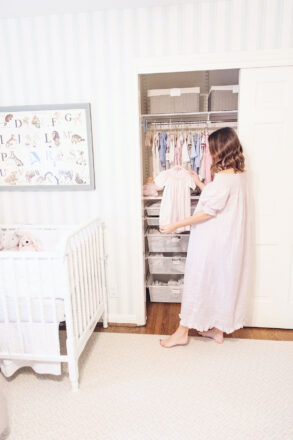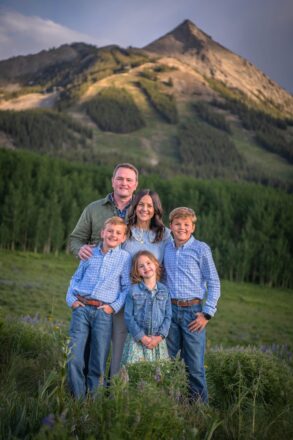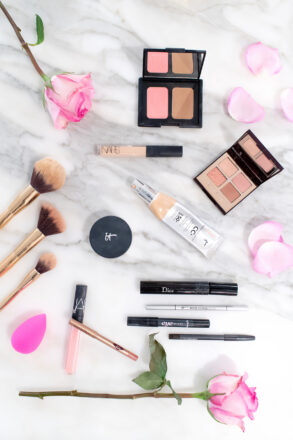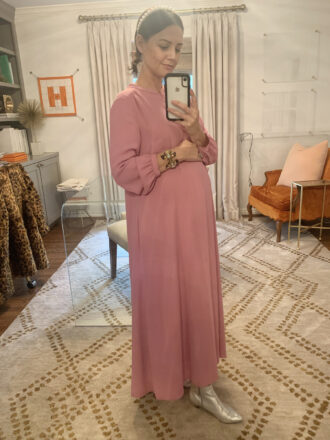
When Sarah Dubbeldam launched Darling Magazine, her mission was to transition the media landscape for women. Focusing on wellness, character, and morality rather than body image and surface-level content, Darling has been a source of inspiration and encouragement for women all over the world.
I had the privilege of meeting and having dinner with Sarah at the launch and co-celebration of Darling & Magnolia Journal’s spring issues in Waco, Texas this spring. I was immediately drawn to Sarah for her humbleness, her authenticity and her hilarious and honest account of balancing work and motherhood. We were thrilled to have the opportunity to ask Sarah about her journey with Darling as well as her personal journey as a mother. We loved hearing how she balances motherhood and work, her wisdom on traveling with kids, the values she hopes to instill in her son, and how she takes time for herself in the midst of running a company and being a mom. Read on below to enjoy her wisdom as well!





Your idea for Darling came about over coffee with a friend as a way to empower women and provide a positive media outlet in a world of negative and unrealistic voices. Darling has since evolved into an established media company with digital, print, and offline event offerings. Tell us a little about your initial vision and hope for Darling, and how it has expanded and evolved over time.
SD: My initial vision for Darling was actually quite similar to what it has become now. We started with an online blog and then put our idea on Kickstarter in order to build the print magazine. Social media helped build even more of a community. That led into events, video, and eventually into offering creative services. Now we are a multi-arm media company. Our vision going forward is to press into more in-person events and be able to bring the mission to life for women.
You were previously a model, and a part of Darling’s policy is to not Photoshop any of the women in your magazine. How did your experience as a model contribute to the vision for Darling?
SD: When I was a model, I found it very disturbing that every woman looked the same. When you go to an audition, you have to fill out a form with all your measurements and I realized that everyone in the room looked exactly like me. The roles that were being crafted were really putting women in a box, no matter what they were like. I thought that the idea of beauty was much too constrained.
Also I was modeling for catalogs targeting women in their sixties when I was twenty-one and that just seemed like it was perpetrating the idea that aging is bad and that imperfection is to be avoided at all costs. I didn’t like the idea of erasing flaws or the idea that there were such things as flaws in general. That experience gave me an insider look at the engine behind the problem of media and advertising. I just really wanted to do something different.
When Darling launched you were one of the first voices in the women’s empowerment movement. Now with so many other voices relaying similar messages, how do you differentiate? What do you think sets Darling apart?
SD: A few things set Darling apart. First, we are more of a middle ground because we aren’t angry feminists, and we aren’t politically charged either. We are focused on building bridges, listening and figuring out the balance of co-existing with men in life and leadership. Second, we also go deeper into ideas around soul care and mental wellness, thinking about ideas of integrity and morality, which isn’t always a popular conversation. In a culture often focused on not offending anyone, we feel it’s important to still give thoughtful guidance for women.
You must receive a lot of positive feedback from readers about how Darling has impacted their lives. Is there a specific reader story that has stuck out to you and really encouraged you to keep pursuing this path of empowering women through media?
SD: Yes, one of the most meaningful emails I ever received was from a woman that said, “I never felt I was worth a second look in my life from anyone until I read Darling.” It completely changed her perspective on how she viewed herself and her own beauty.
A lot of women talk about how they keep the magazine and bring it out in different seasons for advice. It’s hard to find a voice that is guiding you through life and has the confidence to say what is right and wrong. I think it’s a bit more balanced perspective on femininity and what it means to be a woman.
Describe the Darling woman in a few words:
SD: She’s aware and open-minded. She thinks globally and cares more about inner development than simply her outer beauty. At the same time, she appreciates fashion, beauty, art, and culture.
You’ve featured many celebrities and notable women in Darling. Are there any who have really stuck out to you as truly exemplifying the Darling woman? Is there anyone you’d love to feature who you haven’t yet?
SD: One of my favorites was Tracee Ellis Ross. She’s just such a powerful woman and so comfortable in her own skin. She was dancing and singing on-set, loving on everyone, being so gracious and kind and humble. She just acted like she was there to serve instead of be served and that was really impactful to me.
As far as people that I’d like to feature–definitely Angelina Jolie and Tom Hanks! I think he is so classic. He’s somehow always stayed out of media drama and he’s been married so many years. He’s almost the antithesis and the exception to what everybody thinks of when they think of celebrity and I just want to know how he does that, how he keeps his head and his humility and his kindness. I think he’s just a fascinating case study.
What does your current role as EIC and CEO of Darling entail on a daily basis?
SD: I oversee all the content for blog, our print magazine, and for social media. I’m also the creative director so I work with all the visuals, color palettes, fonts, anything that’s outward facing. I work with brands, conceptualize partnerships, and help execute them. Basically, I am the touch point with the teams we hire to produce content on all verticals.
You work closely with your husband. How do you all keep work and personal relationships separate? Is it challenging at all to work with your spouse?
SD: We really try to put away our phones when we go home in the evening and ask each other intentional questions such as: What have you been thinking about lately? What are you reading? What podcasts have you been listening to? These tap into our identities outside of work. We go on date nights once a week to have those good conversations.
We work really well together, but you have to decide if it’s good for you or not to work with your husband. We both happen to be extreme optimists and we love creativity, so we get energy versus tension from working with each other. We play off of each other and we just get more and more excited trying to plan something. Our only problem is interrupting each other and sometimes trying to say, “I have a better idea!” There’s definitely a lot of joking that happens, but there are really intense decisions. Overall I think working as a team is super fun for us.
Darling recently debuted a rebrand. You explained that part of the rebrand is a focus on gathering offline and connecting with others face to face. Tell us more about the decision to rebrand and what you hope to accomplish with this new outlook.
SD: We wanted to rebrand from an aesthetic perspective, having had the same logo from our inception. We freshened up our fonts and our design to be more in line with where I was taking the brand through photography.
Also we added the comma after the “g.” From the beginning, we said that Darling was like a letter from a friend. The comma is like a letter, but it also represents the idea of a pause, thinking about the direction you are going, being introspective about your life, waiting, being a good listener and not always having to say your opinion. It represents the idea that good things take time. It’s not always about instant responses. It’s the idea that less is more. It’s also about taking time out of our daily lives to connect with one another and put away our phones because those are the moments that people really remember in life.
How has having baby Judah influenced your outlook on your career and role at Darling?
SD: When I had Judah, I realized that nothing was as serious as I thought it was. You bring a human into the world and you’re like “How is this blog post or Insta tag as important as a person?” I realized that I didn’t have to work as hard. We put so much pressure on ourselves and work such intense, long days. It’s just crazy and so intense. I realized I just want to spend time with him and be more intentional.
You and your husband have traveled internationally with Judah. Is traveling as a family a priority for you all? What are your tips for new parents hoping to do the same but who are nervous about the logistics?
SD: We have taken him everywhere. He’s been to Italy, to London, to Japan for three weeks, all over the U.S., also Canada. I don’t even know how many flights. I think that a lot of people are hesitant to travel with babies because it is a lot of gear. I did a post on Darling‘s website that outlines all the gear I recommend.
Traveling is definitely a priority for our family. We feel that when you have more of a global perspective it changes the way you think. It also enhances my creativity. I’m such a visual person so when I’m seeing new places, it expands the way I produce content.
What is your favorite way to spend quality time with Judah during the week?
SD: I like to take him to the zoo, to go swimming, to the park. We have a big backyard; we’ll draw with sidewalk chalk or I’ll just run around with him. He really is pretty simple in the things he enjoys.
What life lesson or value do you most hope to teach him?
SD: I mainly want to teach him the value of humility, of putting others first in a culture that perpetuates narcissism, realizing that he’s not entitled to anything, but that serving others is most important in life. In a world that is so instant, investing in children can sometimes get translated into expectations for a career that I think aren’t healthy. Instead I want to show him what it’s like to work hard, build teams, and do things that are meaningful.
Parenting is tough, being a working mom is tough. You’ve talked about the importance of discussing honest parenting vs. the glamorous portrayal of parenting so frequently displayed on Instagram. There seems to be a shift in influencers being more open about their tough realities instead of putting a rose colored filter on everything. Tell us a little about your views on this shift and how we can all support one another by being open and honest.
SD: When I became a mom, there were a lot of expectations. There were so many things I didn’t know that I was shocked by. I think that it’s really refreshing to see the reality. I also think it’s taken a bit too far sometimes; it can translate into complaining about your kids. I think it’s important to honor them and some of the difficulties that children bring.
For myself, I’m not very vocal on social media, but I’m super honest with my friends about how toddlers are hard for me and how I don’t know what to do with tantrums. I didn’t know how to change a diaper when I came home from the hospital so I actually looked on YouTube and it was actually really helpful.
I do and try post pictures that capture my most extreme moments of joy with my son because I think that motivating people to think really positively about children is important as well. It’s definitely a balance.
Tell us your family’s morning routine:
SD: We used to wake up when our son was crying. We realized that we wanted to live our lives more intentionally and be aware and present when he woke up, so we started waking up an hour before him, which is around 5:45am to 6:00am.
We make coffee and a light breakfast, sit out on the couch, and we do three things: we read ten minutes from a book (a business book, a spiritual book, or a personal development book), we take moments to journal and pray, and then we share a little bit about what we have going on for that day. When our son wakes up we’ve had coffee, we’ve had time to think and center ourselves before we see him, so that’s out new morning routine.
How do you find time for yourself between work and motherhood? You’ve mentioned the importance of maintaining a bit of your old self after having children — what advice do you have for connecting with your interests and identity outside of motherhood?
SD: I think it’s really important not to lose who you are and still be able to engage in your giftings. For me, that means continuing to do my work. I think it’s important even if you don’t work full-time to have something that you enjoy in your free time. You just have to identify what that is for yourself.
You’ve been very open about your struggles with anxiety and depression. What has been the most helpful advice / tool to help you manage it? What we can all do to break down the stigma around mental health and how can we best support a friend going through depression?
SD: I have always been a person of faith, so that’s a real support to me. I pray about my anxiety, my thought patterns and my worries. Something else that really helped me was counseling.
One of my counselors once said, “You know, anxiety is thinking ‘what if.’ What is at the end of your ‘what if?’ What if the worst thing you imagine actually happens?” I was like, “Well, I definitely wouldn’t die if my worst fear happened.” Then she was like, “Would there be people there to support you? Would God be there to support you in that? Would you probably make it through it?” I said, “Ya.” She told me to try and break down that stigma of the ‘what if.’ It’s just this looming fear that’s not even really real. Even if you follow it down to the very end and it actually happened, realizing that you would be okay is a way to manage your fears.
Ask your friends, “Have you been down lately? Have you been anxious? Do you want to talk about anything?” I’ve been surprised when my friends are like, “I’m actually feeling really depressed.” They are people I would never imagine are actually feeling really depressed. It’s just important to be intentional about that.
What is one piece of advice you would give to a new mom who is trying to find balance between motherhood and career?
SD: I would say definitely advise them to start waking up early. It helps me center myself and think about the way I’m using my time instead of the day just happening to me. Also I don’t really believe in the “you can have it all” idea. I think you can have a lot of things well, but there are some things you have to say ‘no’ to in order to do what you want to do. It’s more about prioritizing the things you can and can’t do versus having it all.
Do you have any follow up questions for Sarah? Leave them in the comments below and be sure to follow her and Darling on Instagram!










Thank you for this interview. It was completely refreshing and fulfilling on so many levels!
As a senior, I found Sarah’s transparency refreshing and spot on! Intentionality is something I want to work more on in my own life. I want to know more about Darling!